Our church talked about the election this week.
We spent some time looking over images from our favorite artist, Carol Aust and we identified which images most spoke to how we were currently feeling. Here are a few of the images that were highlighted by our people:
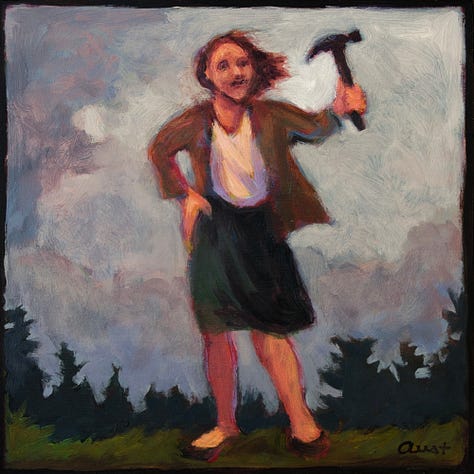
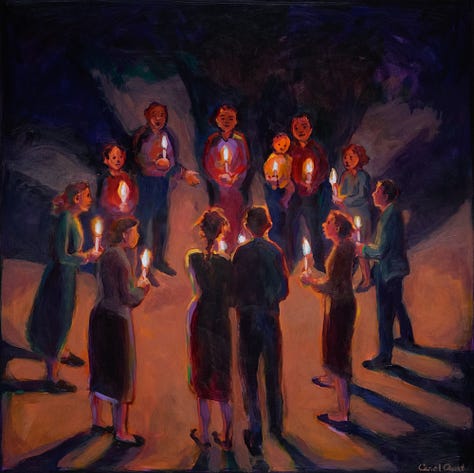
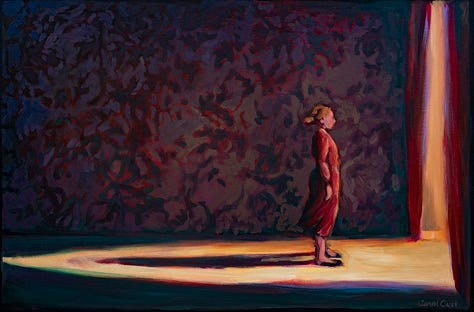
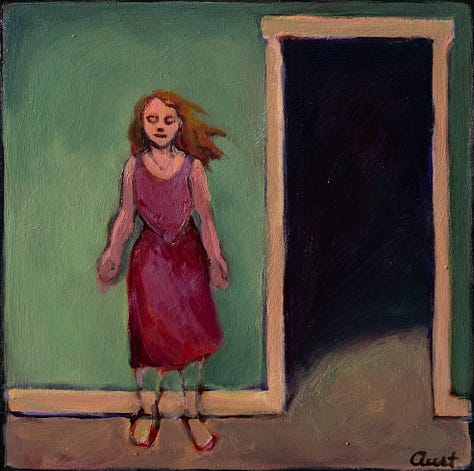
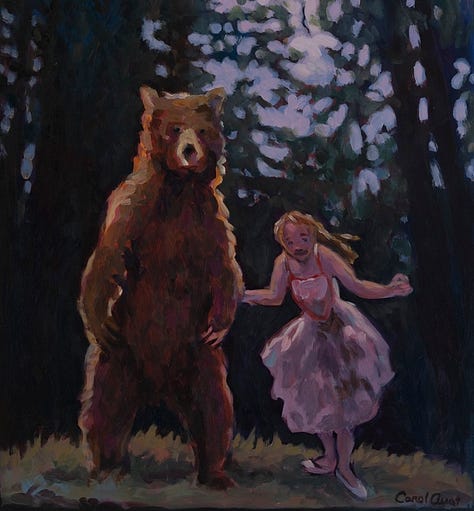

There were tears, there was shaking rage, there were slivers of joy, there was wrestling and fatigue.
We prayed through portions of an Imprecatory Psalm.
We confessed our fears, our doubts, and our anger.
And we did it all safely and unburdened because no one in our church voted for Trump.
That wasn’t exactly a prerequisite or anything to belong to our church or community. We didn’t check your voter registration at the door.
And truthfully, it’s a fact I often struggle(d) with, especially leading up to this year’s election.
I saw posts from other pastors boasting about the political diversity in their midst. How it was such a sign of unity and Kingdom like priorities. And for a very long time this was the kind of make-up I had once hoped for. I once believed the church should be the place, and maybe could be the only place where a staunch Republican could sit in the midst of passionate Democrats they loved and have their heart and minds be softened and grown. Where the Democrats could learn a thing or two about strategy and the realities of rural America.
I no longer hold to that hope.
Because I no longer believe at the heart of our political disagreements soley exists differences of opinion on policy, solutions, or ideas. I believe at the heart of (especially but not particullarly) this last election cycle there existed deep and distinct differences of interests, purposes, desired actions and progress. There continues to exist oppositional hopes, dreams, and desires for this country. Many of us not only disagree on how to get to a common goal— we have different and even opposing goals altogether.
Where I once believed Christian Republicans and Democrats could surely find unity, safety, and sacred conversation around our shared intent of seeing God’s kingdom being actualized on earth as it is in heaven— 2016 fractured that belief, 2020 shattered it, and 2024 has now completely decimated it. With party lines now shifting primarily around “Trump supporter vs. Not”1, I no longer believe opposing sides of such an isle even share the same notion of what the Kingdom of God is. And I don’t know how one finds unity among that. I don’t know if one can.
So for now, as I look at the state of the church and as I continue to take in the stats and polls from white evangelicals2 and what their desires, goals, and hopes for this country are3— I can’t say that I am searching for unity with that. I can’t say that I want unity with that.
What I do want and what I will continue to fight for is solidarity.
Solidarity is not a matter of agreeing with, or supporting, liking, or being inspired by the cause of a group of people. Though all these might be part of solidarity, solidarity goes beyond all of them.
Solidarity is the union of kindred persons arising from the common responsibilities and interests as between classes, peoples, or groups. Solidarity is a community of interests, feelings, purposes, or actions. It is social cohesion. Solidarity moves away from the false notion of disinterest, of doing for others in an altruistic fashion. Instead it is grounded in common responsibilities and interests which necessarily arouse shared feelings and lead to joint action.
Mujerista Theologian, Ada Maria Isasi-Diaz
I am no longer interested in joining together with folks who say they believe the same thing as me, yet such beliefs only continue to result in polar opposite responsibilities and social interests. I am no longer seeking unity with those who claim the name of Christ yet whose intimacy with him seems to lead to opposing feelings and actions toward their neighbors. My core unifying question is no longer, “do we share the same religious beliefs?” but rather, “are we tending to the same spiritual work?”
I long for solidarity with, among, and to those whose interests are that of their most vulnerable neighbors, whose purposes are for the sake of the poor and the marginalized, whose actions are for the bringing of restoration and wholeness to others as much as themselves. I long for solidarity with those who know and practice we cannot have the restoration of one without the other.
And if that means I miss out on political diversity, or on unity with the white evangelicals in my midst, so be it.
What we lack in diversity of values is more than made up for in our diversity of life experience, race, upbringing, ethnicity, perspective, education, and even theological leanings. Despite our differences in all of these areas, we are bonded by our common responsibility and interest to love one another, to love our neighbors, and to take action and vote for the people AND policies that love them both too. That sounds a whole lot more like unity to me anyway.
80% of which supported Donald Trump
PRRI, a nonprofit, nonpartisan organization dedicated to conducting independent research and driving conversations at the intersection of religion, culture, and politics released their 2024 American Values survey revealing 60% of White Evangelicals say that immigrants entering the country illegally today are “poisoning the blood of our country,” 68% believe American culture and way of life mostly changed for the worse since the 1950s, and at 62% White Evangelicals were the only religious group among whom a majority agree that immigrants are invading our country and replacing our cultural and ethnic background.





Oh, this has been my struggle for years. I pray for bravery to step outside of a space that no longer fits me and one that better reflects Jesus and the mission he has called us to.
Agreed! So many of the calls for (or humble-brags of) unity and so on have sounded like “Peace! Peace!” where there is no peace. And so many of the teachers and leaders who have dismissed as divisive anything other than platitudes about the kingdom being bigger than the empire have struck me as insulated to the point of ignorance, in complete denial, or eager to spiritually bypass the uncomfortable emotions to keep things going on as usual (by that, I sadly mean the offering plate).